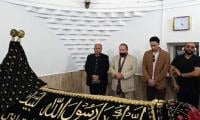The writer is a freelance columnist
and former newspaper editor.
In the US and even before he went there, the COAS General Raheel Sharif has been emphasising the military’s valiant battle against the Taliban militants, the heroics on the field of battle of over 5,000 soldiers who have died and the 12,000 intelligence operations conducted since Operation Zarb-e-Azb began in June 2014.
The military, in one of those verbal clashes that always creates a state of alert in the country has also lashed out in unexpectedly harsh terms against the civilian government for failing to implement the provisions of the National Action Plan agreed on by all political parties early this year.
We are told this little skirmish has been worked out, and both the Sharifs, the one in military uniform and the one in civilian shalwar kameez, are now back on good terms. We can only hope this is true. Regardless of whether it is or not, the point to be made is that the battle against terrorism cannot be won on the battlefield alone. Nor can the civilian government hope to win it in the minds of people when there is almost constant intervention from the military in so many areas of policymaking and as a result the administrative apparatus operates in a state of uncertainty. A single ‘wrong’ move could bring down the wrath of the military once again. The pressure must be tremendous.
But let us assume that the military and the civilian government are truly committed to uprooting terrorism. How is this to be achieved? Killing militants may be one part of the job as far as clearing villages occupied by them in tribal areas is concerned. But this is only a small part of what needs to done. There is an urgent need to understand what truly lies in the hearts of people and what they believe in. This is fundamental to our task of tackling the militant threat.
We do not know what people actually think. Surveys conducted in the country are unreliable and answers often given in conformity with what the interviewees think the surveyors want to put down on their sheet. In Swat for example, a past heartland of militancy, there is considerable support for education for girls.
This exists across Khyber Pakhtunkhwa. The Taliban are in this context seen as enemies. It is also true that most parents are intelligent enough to want their children vaccinated against polio. In these matters, they stand against the Taliban, even if they are unable to take any real action to demonstrate this.
But there are many nuances and many complications. Especially in the larger urban centres, a growing number of people seem to believe that extremist Islamic groups, perhaps because they stand against the West, are a desirable force. The Islamic State, which has eclipsed Al-Qaeda as the most feared group in the world, has been immensely effective in recruiting people worldwide and persuading them the cause they stand for is the right one.
The issue is that in many ways the IS and its leader Abu Bakr al-Baghdadi revert centuries back, and take their inspiration from what happened in those times. They even propagate the idea that the taking of slaves and the carnage of cities is not an evil but something that may need to be done as a means to carry forward the religion. Their effectiveness in preaching this is terrifying.
How then do we battle such a force? Logic is not always the answer. We need to win back people to the version of Islam that existed in the Subcontinent for years. This has been overrun by the far more extremist Salafi and Wahabi groups allowed into the country initially during the era of General Ziaul Haq. At that time, even as a generation watched the world around it change with frightening speed, we were not aware of how long and how dangerous an impact the steps taken then would have on lives and the lives of generations that came after.
To return to the past, it would be necessary to use every element available. This must include a media that essentially propagates extremist thinking in many different ways. It must also of course include school curricula and the sermons delivered by mosque imams. As has been done in other countries, the imams need to be persuaded to put out a gentler version of religion and the same must be given out to people through the television channels and the books students were made to read at every level through their educational lives.
The reality is that religion and discussion on matters related to it have become a kind of obsession in our country. We hear this discourse everywhere, and generally during these discussions the moderate elements are pulled towards the extreme. It is after all hard to deny that being ‘more’ religious could in any way be harmful. As a consequence, those who may hold relatively liberal views fall into line with those who follow a harder line of thinking.
The IS today has moved the margins further by making the hard line a thicker, stronger one; one that links back many centuries into the past and takes its cues from there. The hatred for the West is associated at one level with Baghdadi’s long imprisonment at a US-run jail in Iraq, but at a wider level with the Crusades that brought Muslim forces against Christian ones. The tie-in is an alarming one. It is potentially hugely dangerous.
The same factors exist in our country with US intervention a reality in many areas, drone attacks having taken the lives of innocent people alongside the militants they targeted and a curious clash over the media and social networks between the West and what we have come to call religious values. Social media is used extensively to portray these.
We need to rediscover the balance that once existed. Every citizen, every individual has the right to belief. Religion, though, is a personal matter. It should rest there. The constant debate over it takes forward sometimes dangerous messages. It is no coincidence that the more moderate preachers have been driven out of their own home country. They sometimes speak from Malaysia or the other places they have sought shelter in. Altering this reality would be the true victory.
It would need to go further than Operation Zarb-e-Azb or any kind of military action and it is far harder to conduct than warfare using guns, grenades and bombs. The strategy would have to be lined up with massive development work and perhaps the politics of reason led by a charismatic leader who could persuade people to move in a certain direction. We see no such leaders on the horizon.
But then, it is also true that charismatic leaders arise suddenly and unexpectedly. We can only hope for one in our country before it is really too late to salvage it from the grips of a relentless war that has destroyed numerous aspects of life and threatens to take away still others even as we stand watch and engage in petty arguments locking the military against the civilian leadership.
Email: kamilahyat@hotmail.com
A representational image showing residents walking at a wholesale market in Karachi. — AFP/FileOnce again there is...
A representational image showing late Pakistani human rights activist and Supreme Court lawyer Asma Jahangir. —...
A representational image showing a security personnel sanding guard beside a ship carrying containers at Gwadar port....
A health worker administers polio vaccine drops to a child during a door-to-door polio vaccination campaign in Lahore,...
Armed militants of the banned Tehreek-e-Taliban Pakistan pose for a photograph in Orakzai Agency. —...
An aeroplane of the national flag carrier of Pakistan is seen in this file photo. — AFPWhile Pakistan considers...







